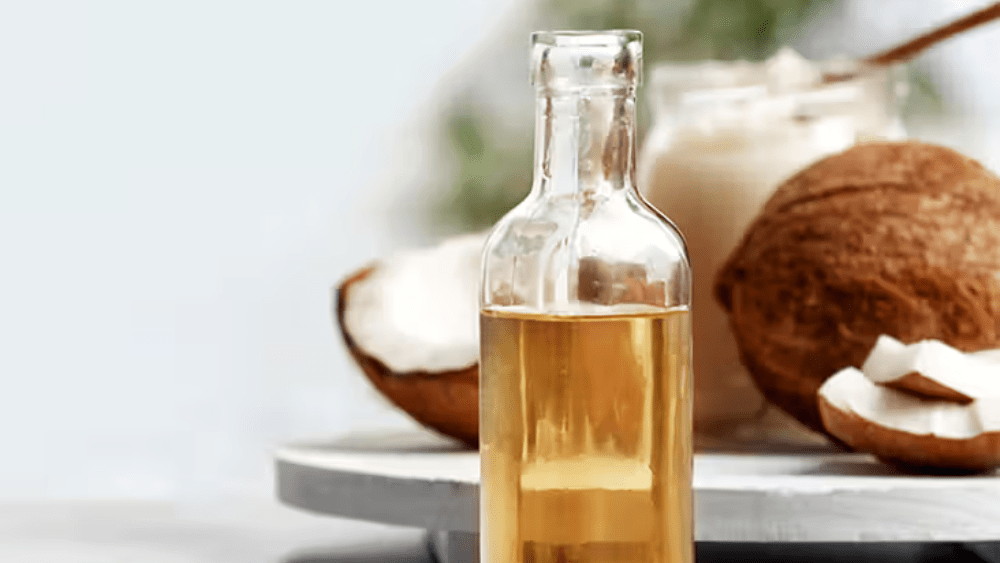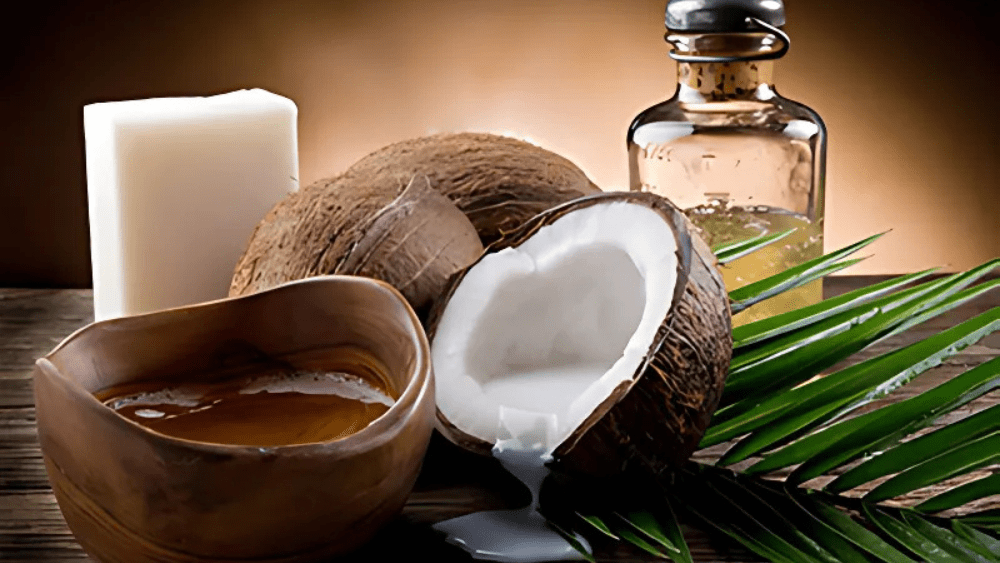Discover the top 10 benefits of using coconut oil in hair care. From deep hydration to promoting growth, learn why coconut oil is your hair’s best friend.
Introduction
Coconut oil has been a go-to beauty staple for centuries, and it’s easy to see why. Packed with nutrients and natural goodness, it’s a simple yet powerful solution to so many hair care challenges. From taming frizz to promoting growth, coconut oil is like a one-stop shop for healthier, more beautiful hair.
What makes coconut oil so special? Unlike many other oils, it can actually penetrate the hair shaft, delivering deep hydration and nourishment where your hair needs it most. Plus, it’s rich in lauric acid, vitamins, and antioxidants, which help keep your scalp healthy and your strands strong.
In a world full of products loaded with chemicals and synthetic ingredients, coconut oil stands out as a natural, budget-friendly alternative. Whether you’re dealing with dryness, dandruff, or damage, or just want to add some shine and softness, coconut oil is the secret weapon your hair has been waiting for.
What Makes Coconut Oil Special for Hair Care?
Coconut oil isn’t just another trendy ingredient—it’s a hair care superstar backed by science and tradition. What sets it apart from other oils and products is its unique chemical structure and nutrient profile, which make it incredibly effective for nourishing and protecting hair. Let’s break down what makes coconut oil so special for your hair:

Rich in Lauric Acid
Lauric acid, a medium-chain fatty acid found abundantly in coconut oil, is the secret behind its deep-penetrating properties. Unlike other oils that sit on the surface of your hair, coconut oil’s molecular structure allows it to penetrate the hair shaft, delivering hydration and nutrients from within.
Packed with Nutrients
Coconut oil is loaded with vitamins like E and K, essential for hair health. Vitamin E acts as a powerful antioxidant, protecting your hair from damage caused by free radicals, while vitamin K promotes overall scalp health.
Antifungal and Antibacterial Properties
Thanks to its natural antifungal and antibacterial properties, coconut oil helps keep your scalp clean and healthy. It can reduce dandruff, soothe itching, and even combat minor infections, making it a great choice for scalp care.
Natural Hair Conditioner
Coconut oil acts as an all-natural conditioner by sealing moisture into the hair. This not only makes your hair soft and shiny but also reduces breakage and split ends.
Prevents Protein Loss
One of the standout benefits of coconut oil is its ability to prevent protein loss from your hair during washing. Protein is the building block of hair, and maintaining it is key to keeping your hair strong and resilient.
Non-Toxic and Chemical-Free
Unlike many commercial products, coconut oil is free from harsh chemicals, sulfates, and parabens. It’s a safe, natural alternative that won’t expose your hair or scalp to unnecessary toxins.
Affordable and Easily Available
Coconut oil is not only effective but also incredibly budget-friendly. Whether you pick it up at your local grocery store or opt for a premium organic version, it’s accessible and economical compared to most hair care products. Coconut oil’s unique combination of properties makes it an irreplaceable part of any hair care routine. Now that we’ve explored why it’s so special, let’s dive into the top 10 benefits of incorporating coconut oil into your hair care regimen.
10 Amazing Benefits of Using Coconut Oil in Hair Care
Coconut oil is a game-changer when it comes to hair care, offering a variety of benefits that cater to all hair types. From nourishing your strands to enhancing their overall health, this natural elixir can transform your hair care routine. Here’s a closer look at the top 10 benefits of using coconut oil in hair care:

Deeply Moisturizes Hair
Coconut oil is an excellent natural moisturizer. Its small molecular structure allows it to penetrate deep into the hair shaft, locking in moisture and combating dryness. Whether your hair is damaged, frizzy, or just in need of hydration, coconut oil can restore its softness and manageability.
Promotes Hair Growth
A healthy scalp is essential for hair growth, and coconut oil excels in nourishing and soothing the scalp. Its antimicrobial properties help reduce issues like dandruff and infections that can hinder hair growth, while regular scalp massages with coconut oil improve blood circulation and stimulate hair follicles.
Reduces Hair Breakage
Hair breakage often results from dryness, brittleness, or damage. Coconut oil strengthens hair strands by reducing protein loss and keeping them well-nourished. By applying coconut oil regularly, you can minimize breakage and promote healthier, longer hair.
Protects Hair from Damage
Coconut oil creates a protective barrier around your hair, shielding it from environmental pollutants, UV rays, and heat damage caused by styling tools. Applying it as a pre-wash treatment reduces protein loss and helps maintain your hair’s integrity during washing.
Fights Dandruff and Dry Scalp
Coconut oil’s antifungal and antibacterial properties make it a great remedy for dandruff and dry scalp. It moisturizes the scalp, reducing flakiness and itchiness, while its soothing nature helps alleviate irritation.
Tames Frizz and Adds Shine
Tired of battling frizz? Coconut oil is a natural smoothing agent that tames unruly hair, leaving it sleek and polished. It also enhances your hair’s natural shine, making it look healthy and vibrant.
Acts as a Natural Detangler
Knots and tangles can cause significant hair damage during combing. Coconut oil makes detangling easier by smoothing the hair cuticle, reducing friction, and allowing your comb to glide effortlessly through your hair.
Improves Scalp Health
Coconut oil nourishes the scalp with essential nutrients, promoting a healthy environment for hair growth. It can help balance oil production, reduce inflammation, and prevent issues like clogged pores, all of which contribute to better scalp health.
Serves as a Heat Protectant
Styling tools like flat irons, curling wands, and blow dryers can take a toll on your hair. Coconut oil acts as a natural heat protectant, forming a barrier that minimizes damage caused by high temperatures while keeping your hair hydrated and smooth.
Cost-Effective and Chemical-Free Solution
Unlike many store-bought hair products, coconut oil is free of harmful chemicals and additives. It’s an affordable, all-natural alternative that delivers excellent results without compromising the health of your hair or scalp.
How to Use Coconut Oil for Hair Care
Coconut oil is versatile and easy to incorporate into your hair care routine, whether you want to hydrate, repair, or style your hair. Here are some of the most effective ways to use coconut oil for hair care:

As a Pre-Wash Treatment
Applying coconut oil before washing your hair can protect it from protein loss and reduce damage during washing.
Steps:
- Take a small amount of coconut oil (about a tablespoon for medium-length hair).
- Warm it up slightly by rubbing it between your palms or using a microwave.
- Apply it to your hair, focusing on the mid-lengths and ends.
- Leave it on for 15–30 minutes before shampooing as usual.
As a Deep Conditioning Mask
For an intensive treatment, use coconut oil as a deep conditioner to restore moisture and shine to dry or damaged hair.
Steps:
- Apply a generous amount of warm coconut oil to clean, damp hair.
- Massage it into your scalp and distribute it evenly through the lengths and ends.
- Cover your hair with a shower cap or a warm towel.
- Let it sit for 30 minutes to an hour (or overnight for very dry hair).
- Rinse thoroughly and shampoo.
For Scalp Care
Coconut oil can soothe an irritated scalp, reduce dandruff, and nourish hair follicles.
Steps:
- Warm a small amount of coconut oil.
- Massage it gently into your scalp using circular motions for about 5–10 minutes.
- Leave it on for at least 20 minutes or overnight for better results.
- Shampoo and rinse thoroughly.
As a Leave-In Conditioner
Coconut oil works as a lightweight leave-in conditioner to tame frizz and add shine.
Steps:
- Take a pea-sized amount of coconut oil.
- Rub it between your palms to melt it.
- Lightly apply it to the ends of your hair, avoiding the roots to prevent greasiness.
For Detangling Hair
Coconut oil can make detangling easier by smoothing the hair and reducing breakage.
Steps:
- Apply a small amount of coconut oil to damp or dry hair, focusing on tangled areas.
- Use a wide-tooth comb to gently detangle your hair.
As a Heat Protectant
Coconut oil can minimize heat damage from styling tools by forming a protective barrier.
Steps:
- Take a small amount of coconut oil and rub it between your hands.
- Apply a thin layer to your hair before using heat styling tools.
To Tame Flyaways and Add Shine
Coconut oil can smooth flyaways and give your hair a glossy finish.
Steps:
- Rub a tiny amount of coconut oil between your fingers.
- Lightly run your fingers over any flyaways or the surface of your hair for added shine.
For Split End Repair
While coconut oil won’t repair split ends completely, it can temporarily seal them and prevent further damage.
Steps:
- Apply a small amount of coconut oil directly to the tips of your hair.
- Repeat this process a few times a week to keep your ends hydrated and healthy-looking.
Overnight Hair Treatment
Using coconut oil as an overnight treatment can provide intense hydration for extremely dry or damaged hair.
Steps:
- Apply coconut oil generously to your hair and scalp.
- Wrap your hair in a silk scarf or cover it with a shower cap.
- Leave it on overnight.
- Shampoo and rinse thoroughly in the morning.
In DIY Hair Masks
Coconut oil can be combined with other natural ingredients like honey, aloe vera, or yogurt for customized hair masks.
Example Recipe:
- Mix 2 tablespoons of coconut oil with 1 tablespoon of honey.
- Apply to your hair and leave it on for 20–30 minutes.
- Rinse thoroughly and shampoo.
Precautions When Using Coconut Oil in Hair Care
While coconut oil offers numerous benefits for hair care, it’s essential to use it correctly to avoid potential issues. Here are some precautions to keep in mind when incorporating coconut oil into your hair care routine:

Use the Right Amount
Why it matters: Coconut oil is highly concentrated, and using too much can make your hair feel greasy or weigh it down.
Precaution:
- Start with a small amount (a teaspoon or less), especially if you have fine or thin hair.
- Adjust the quantity based on your hair length and texture.
Choose the Right Type of Coconut Oil
Why it matters: Not all coconut oils are created equal. Refined coconut oil may lack some of the beneficial nutrients found in unrefined, virgin coconut oil.
Precaution:
- Opt for organic, cold-pressed, unrefined coconut oil to ensure maximum benefits.
- Avoid oils with added fragrances, chemicals, or preservatives.
Patch Test Before Use
Why it matters: Some individuals may experience an allergic reaction or irritation from coconut oil.
Precaution:
- Apply a small amount of coconut oil to a patch of skin (e.g., inside your elbow).
- Wait 24 hours to check for redness, itching, or irritation before using it on your scalp or hair.
Avoid Overuse on Oily Hair
Why it matters: Coconut oil may not be ideal for oily hair types, as it can exacerbate greasiness.
Precaution:
- Use coconut oil sparingly or as a pre-wash treatment to avoid buildup.
- Focus application on the mid-lengths and ends rather than the scalp.
Be Cautious with Protein-Sensitive Hair
Why it matters: Coconut oil helps reduce protein loss, but in some cases, this can make hair feel stiff or brittle, particularly if your hair is protein-sensitive.
Precaution:
- Monitor how your hair reacts to coconut oil. If it feels dry or stiff, reduce usage or alternate with moisturizing oils like argan or jojoba oil.
Don’t Skip Proper Shampooing
Why it matters: Coconut oil can be difficult to wash out and may leave a residue if not removed properly.
Precaution:
- Use a clarifying or sulfate-free shampoo to ensure all the oil is rinsed out.
- Avoid using too much coconut oil if you’re in a rush to wash your hair.
Avoid Excessive Heat During Application
Why it matters: Overheating coconut oil can break down its beneficial properties and increase the risk of burns during application.
Precaution:
- Warm the oil gently, either by rubbing it between your palms or placing the container in warm water.
- Avoid using a microwave, as it can overheat the oil unevenly.
Conclusion
Coconut oil has proven to be a game-changer in hair care, offering a multitude of benefits ranging from deep hydration to scalp health. Its natural properties, including its ability to penetrate the hair shaft, make it an excellent choice for nourishing, protecting, and strengthening hair. Whether you’re dealing with dryness, dandruff, or split ends, coconut oil provides a versatile and affordable solution for achieving healthier, shinier, and more manageable hair.
However, like any product, it’s essential to use coconut oil mindfully. Understanding your hair type and following the recommended precautions ensures you can enjoy its advantages without encountering any unwanted effects. From pre-wash treatments to leave-in conditioners and DIY masks, coconut oil can easily fit into your hair care routine and transform the way your hair looks and feels.
FAQs
Is coconut oil suitable for all hair types?
Coconut oil works best for dry, damaged, or curly hair. However, those with fine or oily hair should use it sparingly to avoid greasiness.
How often should I use coconut oil on my hair?
For most hair types, using coconut oil 1–2 times a week is sufficient. Overuse can lead to buildup, so adjust based on your hair’s needs.
Can coconut oil treat dandruff?
Yes, coconut oil’s antifungal properties can help reduce dandruff when massaged into the scalp regularly.
Can I leave coconut oil on my hair overnight?
Yes, leaving coconut oil overnight provides intense hydration. Just ensure you wash it out thoroughly the next morning.
Does coconut oil promote hair growth?
While coconut oil nourishes the scalp and strengthens hair, it doesn’t directly increase hair growth but reduces breakage, leading to healthier, longer hair over time.
Disclaimer: The information provided in this blog is for educational and informational purposes only. Always consult with a dermatologist or hair care professional before using coconut oil, especially if you have allergies, sensitive skin, or specific hair concerns. Results may vary based on individual hair type and condition. Use products as directed and at your own discretion.

